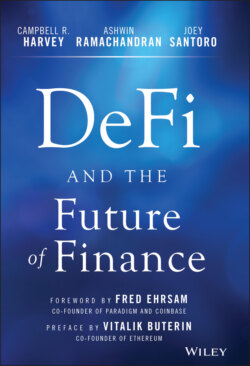Читать книгу DeFi and the Future of Finance - Campbell R. Harvey - Страница 17
ORACLES
ОглавлениеAn interesting problem with blockchain protocols is that they are isolated from the world outside of their ledger. That is, the Ethereum blockchain authoritatively knows what is happening only on the Ethereum blockchain and not, for example, the level of the S&P 500 or which team won the Super Bowl. This limitation constrains applications to Ethereum native contracts and tokens, thus reducing the utility of the smart contract platform; it is generally known as the oracle problem. In the context of smart contract platforms, an oracle is any data source for reporting information external to the blockchain. How can we create an oracle that can authoritatively speak about off-chain information in a trust-minimized way? Many applications require an oracle, and the implementations exhibit varying degrees of centralization.
There are several implementations of oracles in various DeFi applications. A common approach is for an application to host its own oracle or hook into an existing oracle from a well-trusted platform. One Ethereum-based platform known as Chainlink3 is designed to solve the oracle problem by using an aggregation of data sources. The Chainlink white paper4 proposes a reputation-based system. We discuss the oracle problem later in more depth. Oracles are surely an open design question and challenge for DeFi to achieve utility beyond its own isolated chain.
